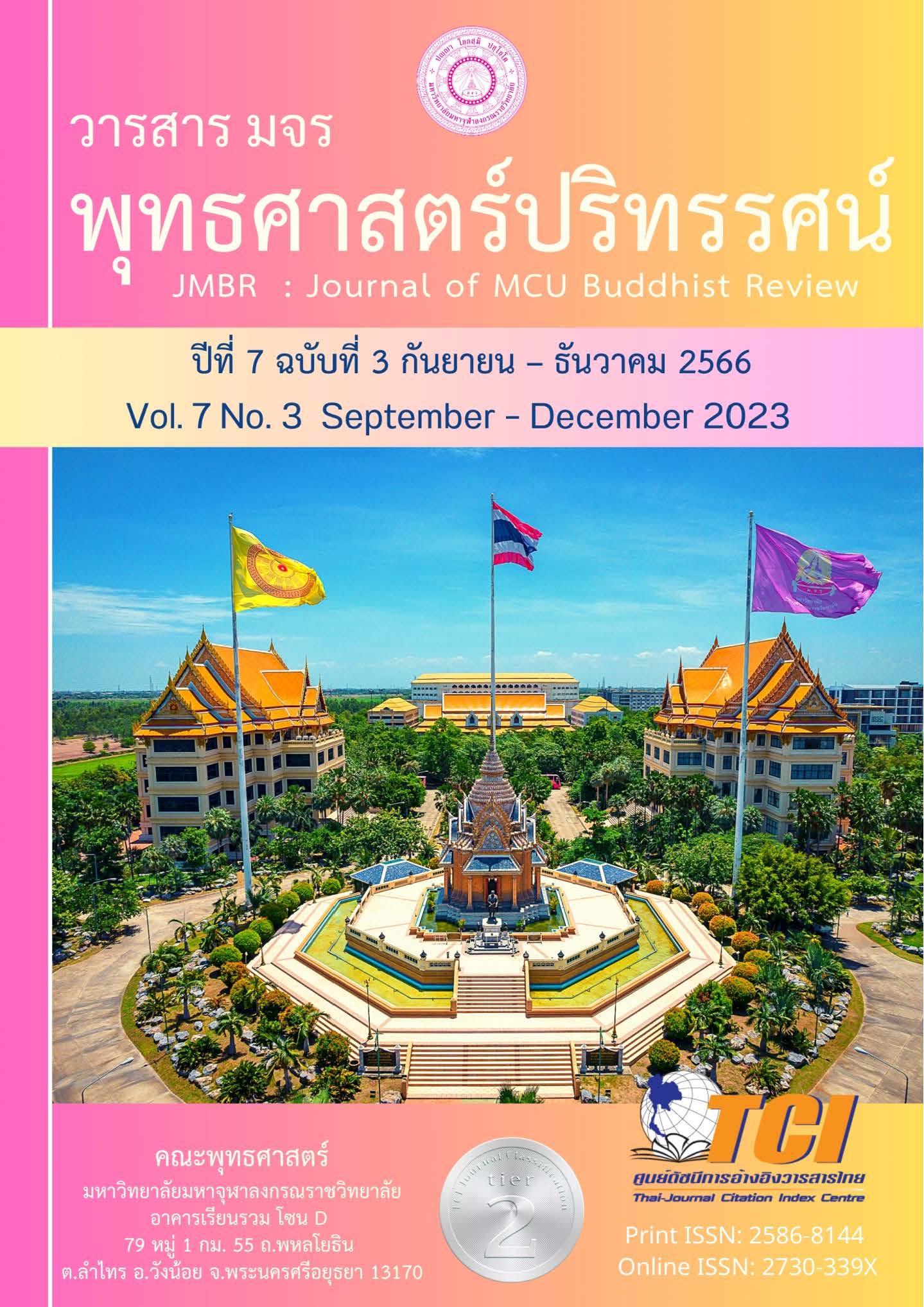การยกระดับระบบฝึกอบรมพระธรรมทูตสายต่างประเทศกับการพัฒนาทักษะด้านนวัตกรรมคุณธรรมจริยธรรมเพื่อการเผยแผ่พระพุทธศาสนาอย่างยั่งยืน
Main Article Content
บทคัดย่อ
งานวิจัยนี้มีวัตถุประสงค์ 1) เพื่อศึกษาการยกระดับระบบฝึกอบรมพระธรรมทูตสายต่างประเทศ 2) เพื่อพัฒนาทักษะด้านนวัตกรรมคุณธรรมจริยธรรมของพระธรรมทูตสายต่างประเทศ 3) เพื่อนำเสนอแนวทางการยกกระดับระบบฝึกอบรมพระธรรมทูตสายต่างประเทศกับการพัฒนาทักษะด้านนวัตกรรมคุณธรรมจริยธรรมเพื่อพัฒนาชุมชนและเผยแผ่พระพุทธศาสนาอย่างยั่งยืน ศึกษาพระภิกษุผู้ที่เข้ารับการฝึกอบรม พระธรรมทูต วิทยาลัยพระธรรมทูต มจร อยุธยา เครื่องมือใช้แจกแบบสอบถาม วิเคราะห์ด้วยการแจกแจงความถี่ และหาค่าร้อยละ จำนวน 27 รูป/คน วิเคราะห์และนำเสนอผลการวิจัยเชิงพรรณนา
ผลการวิจัยพบว่า 1) ระบบฝึกอบรมพระธรรมทูตสายต่างประเทศ ของวิทยาลัยพระธรรมทูต มีหลักการ วิธีการ แนวทางการบริหารจัดการและปฏิบัติในการฝึกหัดพระธรรมทูตสายต่างประเทศอยู่ในขั้นที่ควรสานต่อ, ทักษะของผู้เข้ารับการฝึกอบรมมีอยู่ในขั้นที่ควรสนับสนุน ได้แก่ (1) ทักษะด้านวิชาการ (2) ทักษะด้านสาธารณูปการ (3) ทักษะด้านวิปัสสนากรรฐาน 2) หลักอริยมรรคมีองค์แปดเป็นหลักพุทธธรรม ในการวิเคราะห์ปัญหา สรุปได้ 3 ข้อ ได้แก่ (1) ศีล สำรวมกาย วาจา ใจ (2) สมาธิ ตั้งใจมั่น (3) ปัญญา รอบรู้ 3) กระบวนการพัฒนาแก้ไขปัญหา ระบบการฝึกอบรม ได้แก่ (1) ระยะเวลาฝึกอบรม (2) ตารางฝึกอบรม (3) วิธีการฝึกอบรม (4) แนวทางพัฒนาทักษะ (5) แนวทางเผยแผ่ธรรม (5) วิชาการทางพระพุทธศาสนา 4) กิจกรรมสร้างสรรค์ประสบการณ์พิเศษนอกสถานที่ 5) ได้องค์ความรู้ใหม่ ได้แก่ (1) ด้านสังคม คือ พึ่งพาอาศัยกันได้ (2) ด้านวิทยาศาสตร์ คือ สามารถพิสูจน์ได้ (3) ด้านพัฒนา คือ ปรับปรุงแก้ไขปัญหา (4) ด้านสร้างสรรค์นวัตกรรม คือ ลงมือทำนำไปสู่การเปลี่ยนแปลงที่ดีกว่า (5) ด้านระยะเวลา คือ เป้าหมายที่แน่นอน (6) ด้านตาราง คือ กำหนดการที่ชัดเจน (7) ด้านวิธีการ คือ สามารถฝึกอบรม (8) ด้านแนวทางพัฒนา คือ พัฒนาทักษะผู้เข้ารับการฝึกอบรม (9) ด้านแนวทางเผยแผ่ คือ การบอกต่อธรรม และ(10) ด้านทักษะวิชาการ คือ เชี่ยวชาญนวัตกรรมคุณธรรมจริยธรรม
Article Details

อนุญาตภายใต้เงื่อนไข Creative Commons Attribution-NonCommercial-NoDerivatives 4.0 International License.
- บทความที่ได้รับการตีพิมพ์เป็นลิขสิทธิ์ของวารสาร มจร พุทธศาสตร์ปริทรรศน์
- ข้อความใดๆ ที่ปรากฎในบทความที่ได้รับการตีพิมพ์ในวารสาร ถือเป็นความรับผิดชอบของผู้เขียนบทความ และข้อคิดเห็นนั้นไม่ถือว่าเป็นทัศนะและความรับผิดชอบของกองบรรณาธิการวารสาร มจร พุทธศาสตร์ปริทรรศน์
เอกสารอ้างอิง
กุลธิดา นุกูลธรรม และคณะ. (2554). การศึกษาความต้องการการฝึกอบรมของครูในโรงเรียนเขตภาคกลางตะวันตก. รายงานการวิจัย คณะศึกษาศาสตร์และพัฒนศาสตร์: มหาวิทยาลัยเกษตรศาสตร์ วข.กำแพงแสน.
ณัฐพงษ์ เพราแก้ว. (2561). การยกระดับคุณภาพการศึกษาและการเรียนรู้ตลอดชีวิต. การจัดทำงบประมาณในลักษณะบูรณาการเชิงยุทธศาสตร์. ประจำปีงบประมาณ 2561.
ปิยะฉัตร จิตต์ธรรม และคณะ. (2563). การขับเคลื่อนและหนุนเสริมโครงการเพาะพันธุ์ปัญญาเพื่อความยั่งยืน. รายงานการวิจัย ศูนย์พี่เลี้ยงโครงการเพาะพันธุ์ปัญญาสถาบันนวัตกรรมการเรียนรู้: มหาวิทยาลัยมหิดล.
ฝ่ายฝึกอบรม. (2558). คู่มือการปฏิบัติงานการจัดโครงการฝึกอบรม. กรุงเทพฯ: เอกสารการจัดการความรู้ KM กรมการเจ้าหน้าที่ กรมการจัดหางาน.
พระพรหมคุณาภรณ์ (ป.อ.ปยุตฺโต). (2556). พุทธวิธีในการสอน. พิมพ์ครั้งที่ 18. พิมพ์เป็นธรรมทาน. กรุงเทพฯ: วัดญาณเวศกวัน.
มหาจุฬาลงกรณราชวิทยาลัย. (2539). พระไตรปิฎกภาษาไทย ฉบับมหาจุฬาลงกรณราชวิทยาลัย. กรุงเทพฯ: โรงพิมพ์มหาจุฬาลงกรณราชวิทยาลัย.
ทิศนา แขมมณี. (2557). ศาสตร์การสอน: องค์ความรู้เพื่อการจัดกระบวนการเรียนรู้ที่มีประสิทธิภาพ. พิมพ์ครั้งที่ 18. กรุงเทพฯ: สำนักนักพิมพ์จุฬาลงกรณ์มหาวิทยาลัย.
เสาวภา ปัญจอริยะกุล. (2561). การวิจัยปฏิบัติการในชั้นเรียนเพื่อยกระดับผลสัมฤทธิ์ทางการเรียน. รายงานการวิจัย มหาวิทยาลัยราชภัฏเชียงใหม่.
สัญญา สัญญาวิวัฒน์ และคณะ. (2550). การบริหารจัดการแนวพุทธ. กรุงเทพฯ: จุฬาลงกรณมหาวิทยาลัย.


